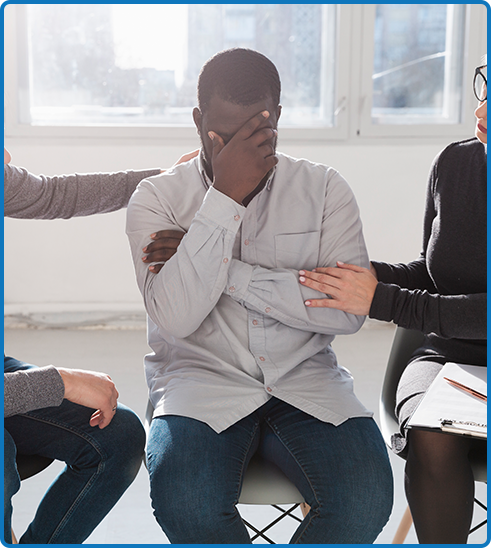
Behavioral health issues often require intensive evaluation, treatment, and management before they could get worse. At HCPSC, our patients get comprehensive care for acute as well as chronic behavioral health issues.
From assessment and treatment of mood and personality disorders to specialized programs that address more serious issues like substance use and suicidal ideation, the healthcare providers at HCPSC deal with all.
What makes it even worse is the limited access to mental health services, especially in remote areas.
In addition, we offer specialized services to senior citizens suffering from behavioral health issues, such as depression, anxiety, dementia-related behaviors, and adjustment disorders.
Behavioral Health Services at HCPSC
Behavioral & Emotional Health
At HCPSC, behavioral healthcare providers and psychiatrists are available for assessment, treatment, and case management of common issues like depression, anxiety, personality disorders, eating disorders, and neurodegenerative conditions.
New mothers who face postpartum depression or have other postnatal emotional health issues are also treated at HCPSC. Moreover, the team is trained to diagnose and treat behavioral health issues in children and adolescents, including autism, anxiety, personality difficulties, ADHD, and conduct disorder.


Substance Use Counseling
HCPSC offers highly qualified and experienced substance abuse counselors who diagnose problem behaviors in people with SUD and devise an appropriate treatment strategy.
These professionals are aware that the journey from drug dependence to a healthy, drug-free life may begin in a rehabilitation center, but it extends far beyond those walls. It involves ongoing support, persistence, and a willingness to face the challenges that will inevitably arise.
HCPSC offers the support and encouragement these individuals need to break the unhealthy use cycle and start living a normal life.
Medication-Assisted Treatment (MAT)
Sometimes counseling and other therapeutic techniques like psychosocial support are not enough to treat certain behavioral health issues, particularly substance use. MAT at HCPSC makes use of medications that have been approved by the FDA for the treatment of drug dependence and other disorders.
Some of these medications include;
- Buprenorphone
- Naltrexone

MAT is also used for the treatment of depression and anxiety and certain disorders in children like autism and ADHD.
If you or a loved one is struggling with an emotional health problem, it is advisable to consult a medical professional to speak about your struggles and get the condition properly diagnosed and treated before it worsens.
Call 843-510-5113 to connect with a behavioral healthcare provider from HCPSC Or get in touch with us by visiting our Contact Us page.
Behavioral Health & COVID-19
The social, economic, and physical health consequences of COVID-19 have been pretty challenging since the beginning of the pandemic.
But researchers have now recognized that its impact on behavioral health and quality of life is also a growing concern.
The stress and uncertainty caused by the novel coronavirus and the measures put in place by governments to prevent its spread have led to anxiety, depression, alcohol and substance misuse, and many other behavioral health issues worldwide.
What makes it even worse is the limited access to emotional health services, especially in remote areas.
This has exacerbated the situation for those who have already been facing behavioral health issues.
According to a study conducted in 2021, almost 50% of all adults living in the US reported experiencing anxiety and depression symptoms.
If we want to return to our pre-pandemic lifestyle and proactively cope with the economic and emotional repercussions of the pandemic, we must address its impact on behavioral health as a community.
How Does COVID-19 Affect Behavioral Health?
Since its beginning, the pandemic has caused widespread fear, uncertainty, and disruption to daily life all over the world.
However, this is not the only way COVID-19 impacts an individual’s behavioral and emotional health.
It has also been found that people who contract the virus are likely to experience some behavioral health changes, which include; [2]
- Brain fog (confusion and lack of focus)
- Anxiety
- Depression
- Suicidal behavior
- Sudden loss of consciousness
- Hallucinations and thinking disorders
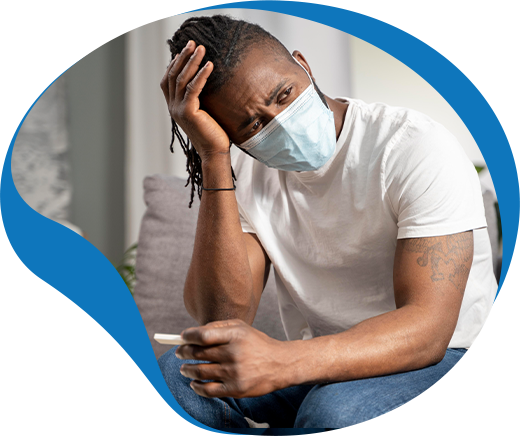
Brain fog, or cognitive dysfunction, is a condition characterized by temporary memory loss, confusion, and a feeling of mental exhaustion.
It has been observed that some individuals recovering from the coronavirus may experience symptoms of brain fog for a short period of time. In contrast, others may experience it for an extended duration.
If a behavioral health issue (such as the ones mentioned above) extends for more than six months after recovering from COVID-19, it is considered long COVID.
In addition, post-traumatic stress disorder or PTSD is also seen in patients who have had COVID-19 infection. People who suffer from this condition may experience the symptoms for months or even years that follow. That is why these symptoms are often termed Post-COVID Conditions or PCC [3].
Although anyone who has been infected with COVID-19 can experience Post-COVID Conditions, they are more common in people who;
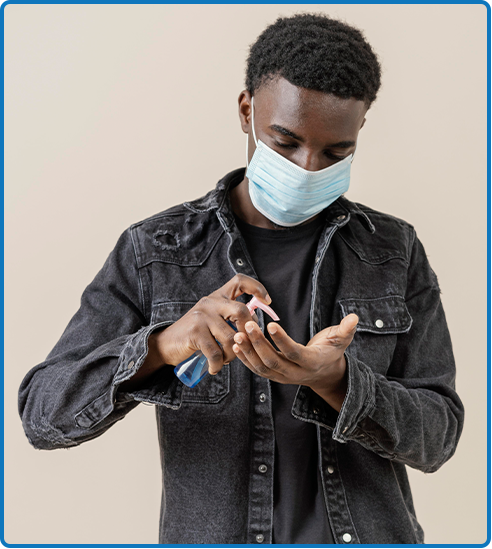
Experienced severe COVID-19 symptoms
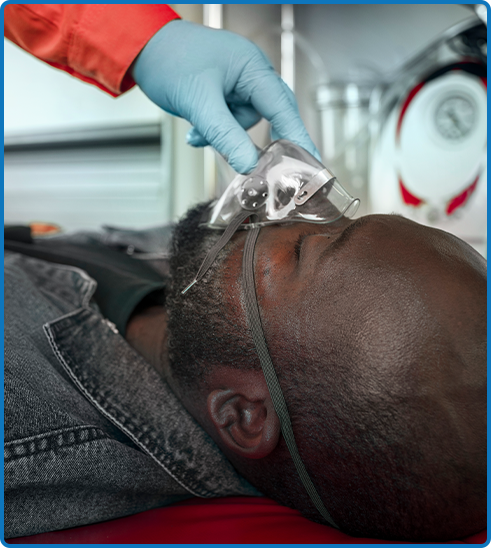
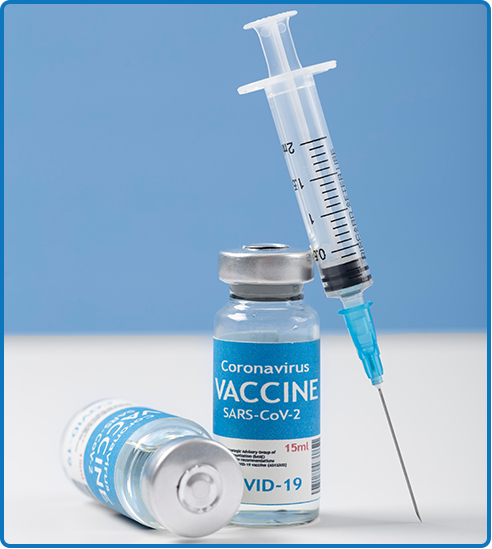
Are NOT vaccinated against the virus
Depression, anxiety, sleep disorders, and difficulty thinking or concentrating (brain fog) are among the most common neurological symptoms people may experience as Post-COVID Conditions after COVID-19.
It is important to recognize that these behavioral health conditions can worsen and become much more severe later if not detected or treated on time.
The Economic Impact of COVID-19
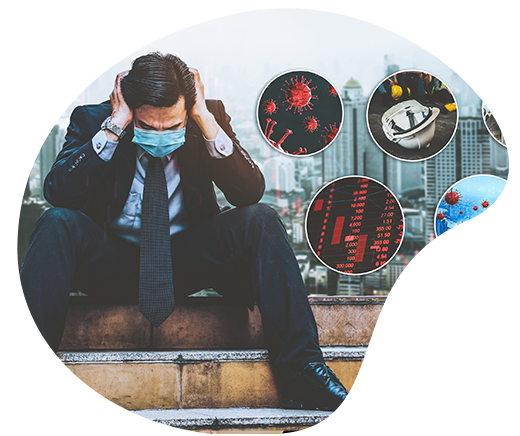
The pandemic’s economic impact has also contributed to the increase in stress levels among individuals.
The rising unemployment rates, reduced income levels, and uncertain futures have led to financial difficulties among people. These problems have made individuals worry about their ability to provide for themselves and their families.
As a result, they suffer from behavioral health issues, including depression, feelings of hopelessness, and even suicidal thoughts.
Although behavioral health problems are more pronounced among disadvantageous groups, stress behaviors have been recognized in almost every group of society.
These behaviors include
- Protective behaviors, and
- Resistive behaviors
Protective behaviors are personal characteristics that people exhibit as a defense against stress. These behaviors greatly facilitate decreasing risk factors and controlling severe COVID-19 outcomes.
Resistive behaviors are exhibited by people as a response to stress in which they develop resilience to stress. It’s like becoming immune to stress with no intention of taking any remedial steps to control it.
As the pandemic continues to disrupt daily life, it is essential to prioritize mental health and seek support when needed.
How the Pandemic Affects the Behavioral Health of Children
There is insufficient data to infer how COVID-19 affects children’s behavioral and emotional health. However, according to research supported by NIH, factors exist that may affect children’s cognitive, emotional, and social development [6].
These factors include;
- Online classes or virtual school
- Wearing a face mask in public places
- Limited access to caregiving services
- Financial instability
- Disruption of daily routine
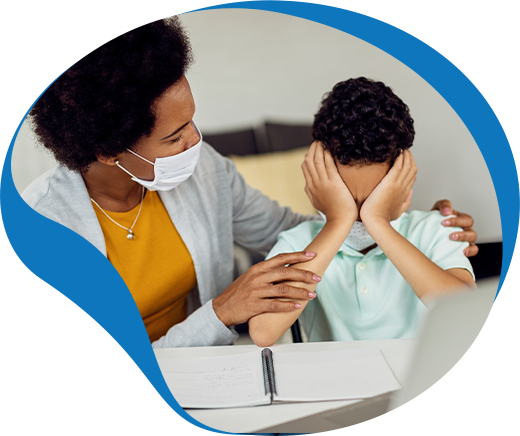
Anxiety, depression, loneliness, stress, and fear were five of the most common behavioral health issues found in children and adolescents after the pandemic.
It was also found that children and adolescents with underlying medical conditions, such as obesity, ADHD, and OCD, were particularly vulnerable to behavioral health issues during the pandemic.
In addition, containment measures like quarantine and social distancing also increased the risk of psychological impacts in children and adolescents.
Stress Coping Mechanisms in Children
Here are some of the suggested coping mechanisms to reduce stress and other behavioral health issues among the pediatric population during the pandemic;
Engaging in physical activity
Physical activity has been shown to release endorphins, improve mood, and reduce stress in children. Additionally, different physical activities can provide a sense of accomplishment and boost self-esteem in this group.
Connecting with family
By staying associated with family members, kids can feel a sense of comfort and security knowing they have a support system they can rely on. This can be a great way to keep children from stress and anxiety during these uncertain times.
Limiting screen time
Studies have shown that prolonged screen time can lead to increased stress and anxiety levels in kids. With the pandemic forcing many children to spend more time online, limiting their screen time is more important than ever to keep behavioral health issues at bay.
Cognitive restructuring
This is a coping technique in which children are guided to replace negative feelings and thoughts with positive ones. Parents and caregivers can effectively use this technique to change a kid’s perception of a particular situation.
By practicing these coping strategies, families can deal with psychological distress during the pandemic, especially for high-risk children and adolescents.
In addition to practicing these steps, getting tested and vaccinated against the coronavirus on time is also important. If you have this inner satisfaction that the virus is not going to harm you, its impact on your emotional health will not be much.
This also suggests that a positive outlook and a belief in one’s ability to cope can help to reduce the negative impact of uncertain times.
Clinical Evaluations for Assessing Behavioral Health After COVID-19

While it’s difficult to diagnose many behavioral and emotional health issues, especially depression, clinical evaluations may start by identifying some signs and symptoms.
Talking to the patient is the next step that helps to understand how a person feels on a daily basis, the behaviors he/she exhibits, and their lifestyle habits.
In addition to feeling helpless, sad, angry, and irritable, you may experience some physiological changes during this time.
Here are some of the physiological changes that have been observed in patients after COVID-19
- Body aches and pains
- Loss of appetite
- Sleep cycle disruption
- Sudden weight loss/gain
- Fatigue and loss of energy
These symptoms may last for many days at a time. Since they affect your physical health, they can disrupt your daily life and worsen stress.
If you are experiencing these signs and symptoms without any other underlying medical health condition, it is time to consult a physician.
It’s common for physicians to begin the diagnosis process with laboratory examinations followed by depression screening and some other procedures.
Laboratory Examinations
In order to assess your mental health after COVID-19, particularly if you’re experiencing the above-mentioned symptoms along with anxiety, your doctor may conduct some blood tests to analyze;
- The level of electrolytes in the blood
- Liver function
- Kidney function

These preliminary tests are performed to find out if your liver and kidney are functioning properly. Because if they are not, the depression medications may not work as expected.

Depression Screening
There are a number of screening instruments that your doctor may use to analyze the severity of your symptoms.
These include;
1.BDI or Beck Depression Inventory
This is based on a 21 multiple-choice questions self-report that helps to gauge symptoms, such as feelings of sadness, loss of interest in activities, and changes in appetite and sleep patterns.
2.HRSD or Hamilton Rating Scale for Depression
Again, this is a multiple-choice questionnaire through which doctors can gather important information about their patient’s current emotional state, symptoms, and behavioral patterns.
3.PHQ-9 or the Patient Health Questionnaire-9
The PHQ-9 is a self-administered questionnaire that consists of nine items based on criteria established for diagnosing major depression in individuals.
It is important to recognize the signs of behavioral health problems and seek professional help as early as possible.
By seeking help, individuals can receive proper treatment and support to manage their symptoms and improve their overall behavioral health and well-being. Don’t hesitate to seek help if you have concerns or need support.
WHO Recommendations
The World Health Organization (WHO) recently published a set of recommendations aimed at helping countries minimize the behavioral health consequences of the COVID-19 pandemic.
The essential points of this report are; [4]
- Countries must integrate Mental Health and Psychosocial Support programs within public health emergencies to mitigate and address behavioral health issues as and when they arise.
- Healthcare workers should promote social connections, offer psychological support, and address the needs of vulnerable groups.
- Countries must allocate more resources to cater to the increased demand for mental healthcare during the pandemic.
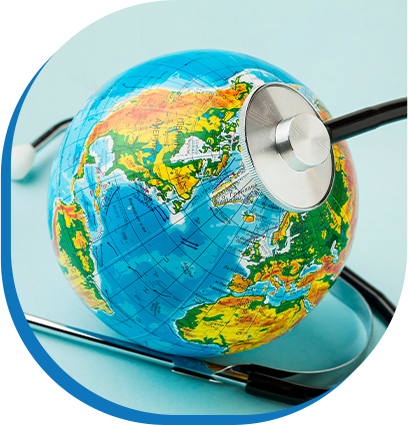
There is a need to scale up behavioral health services to eliminate the obstacles and to address the needs of different vulnerable groups, particularly ethnic minorities, and children.
Self-care Strategies to Prevent Behavioral Health Disorders After COVID-19
It is now quite clear that the pandemic has affected the mental health of a large number of individuals all over the world, including children and adolescents.
However, there are some self-care strategies that you can adopt to reduce stress and stay away from other serious behavioral health issues during these uncertain times.
Reduce Stress Triggers
Here are some techniques suggested by Mayo Clinic [5] to reduce stress triggers during COVID-19;
Maintain a daily routine.
Sticking to a daily routine can help reduce stress and anxiety levels by providing a sense of structure and predictability. By having a consistent daily schedule, people can improve their overall well-being and promote better behavioral health, especially during COVID-19.
Keep yourself busy.
Engaging in hobbies that can be done at home is an excellent way to distract one’s mind and take a break from the stressors of daily life. You can keep yourself busy by painting, gardening, or reading to get rid of negative thoughts about the pandemic.
Limit screen time.
Excessive screen time can lead to negative effects on behavioral health. By setting boundaries for screen time and taking breaks from technology, you can allow your minds to rest and reduce the risk of feeling overwhelmed by all the negative news.
Stay away from the news and media.
The constant news coverage of COVID-19 across all forms of media, including social media, can often amplify fears about the disease. Limit your social media exposure to lessen the overwhelming feelings of uncertainty.
In addition to these, staying connected with friends and family, helping others around you, and setting priorities can greatly help to keep stress and anxiety at bay.
Avoid Stigma
It has been seen during the pandemic that people start avoiding each other due to fear of getting COVID-19.
While it’s true that in response to the pandemic, many health organizations advised people to maintain physical distance and avoid shaking hands as a precautionary measure, it is important to note that they should not become a routine practice and a way to show discrimination.
We should try to strike a balance between caution and normalcy so that people won’t be affected by our behavior and still be able to interact in meaningful ways.
According to Mayo Clinic, people who have been victims of COVID-related stigmas are mostly;

People of Asian descent


People with sickness
These stigmas are mainly a result of inaccurate or false information about COVID-19 circulating on social media that target specific groups or ethnicities. To minimize these fears and ensure behavioral health issues remain at a minimum, we should;
- get the facts only from reliable sources,
- reach out to people who feel fearful or stigmatized, and
- show respect to healthcare workers

Why Is It Important to Seek Medical Help?
People have always found it difficult to talk openly about their behavioral health or reveal that they are experiencing depression or anxiety regardless of their nationality or ethnicity.
However, this stigma must be eradicated once and for all, especially with the number of behavioral and emotional health cases growing with each passing day. It is essential to understand that seeking help is not a sign of weakness; instead, it deems you stronger and more empowered.
The incidence of many emotional health issues has increased after COVID-19. Among these issues, the most serious and ones that need immediate medical intervention include;
- Self-mutilation
- Psychosis
- Suicide
It is also seen that if mild and manageable problems like depression, sleep disorder, and panic disorder are not diagnosed and treated on time, they may lead to more serious issues like the ones mentioned above.
Moreover, since people have been advised to stay at home during the pandemic, it has resulted in an increase in the number of psychological problems. These include;
- Alcohol and drug misuse
- Addictive behaviors
- Increased cases of domestic violence
- Sexual abuse
These psychiatric illnesses are being seen as the aftermath of COVID-19, and they are not to be taken lightly. Even small daily changes like sleep and appetite disturbances and emotional distress must NOT be ignored or overlooked.
So, if you or your loved one is suffering from mental distress, anxiety, or any other minor or major symptom, whether it is because of COVID-19 or occurring as a Post-COVID Condition, you must, at all costs, seek medical help immediately.
Due to social distancing measures, many people now find it difficult to visit healthcare professionals in person. To counter this problem, telehealth services have recently gained widespread popularity.
Now patients can receive medical care without having to leave the comfort of their homes. Telehealth offers video consultations, remote monitoring, and online prescription services through reliable and convenient tools.
If you are hesitant to visit a psychiatrist to discuss your behavioral health issues, telemedicine or telepsychiatry is the perfect alternative for you.
You can call 843-510-5113 to get in touch with a behavioral healthcare provider immediately, particularly if you are also experiencing behavioral health problems after COVID-19.

